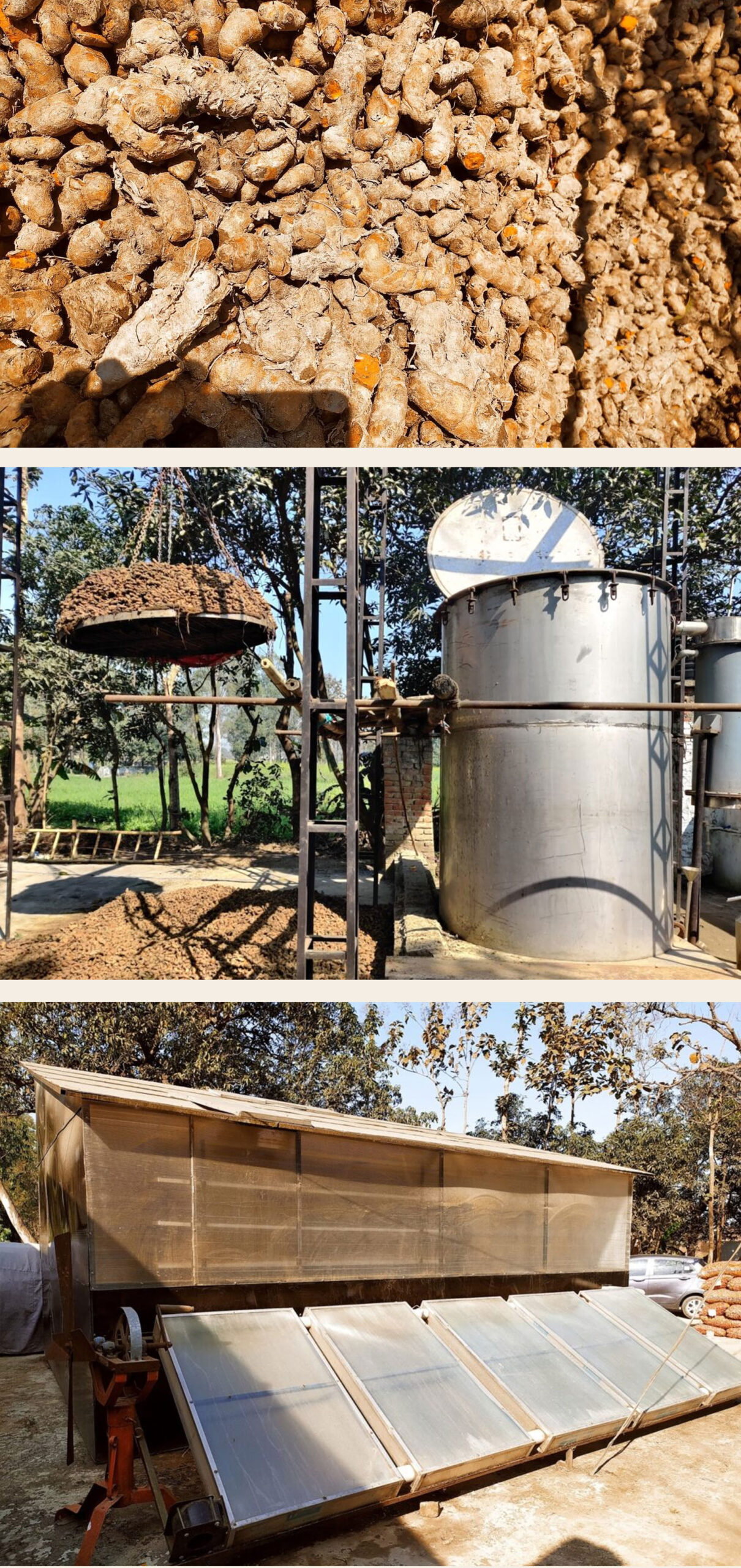Kushinagar district is a turmeric growing belt in the state of Uttar Pradesh. Small farmers in Kushinagar cultivate turmeric alongside paddy, sugarcane, and fruits and vegetables like banana, chilli, brinjal and lemon. Land holdings are small and fragmented, and farmers usually grow turmeric in less than 0.5 acres of land, which yields under 1 quintal for every decimal area. Generally, these farmers directly sell their raw turmeric produce at the local market or to a middle man (local aggregator), as they do not have the capacity or means to process their produce before sale. In its raw form, turmeric fetches poor prices, an average of Rs. 1100 per quintal. The per acre cost of cultivation for turmeric is ~Rs. 20,000, and the average income from its cultivation is a mere Rs.40,000 over 8 months.
In its processed form, turmeric powder has high market value and sells for Rs.150-250 per kilogram. However, the quality of turmeric and its market value are primarily defined by its processing quality. Traditionally, turmeric processing involves boiling the rhizomes in an open pot and then leaving them to dry in the sun. This crude, albeit low-cost, method compromises the quality of turmeric as the boiling and drying processes are not controlled or uniform and the produce also becomes highly contaminated due to being constantly exposed to dust and other impurities. The risk of adulteration in such unsupervised and unstandardised processes is also very high. But farmers in Kushinagar did not have an option but to sell turmeric in its raw form, due to the lack of any localised processing facilities.
To address this Sustain Plus supported a local FPC , Lord Buddha Vegetable Producer 4 Company Ltd (LBVPCL), to set up an end-to-end turmeric processing facility at Kushinagar in 2021. LBVPCL has collectivised 703 turmeric farmers across Kushinagar and Gorakhpur districts of Uttar Pradesh, and works with them to improve the turmeric value chain, through its cultivation to final product stage, so that farmers may recover a fair price for their quality produce.
A one of its kind end-to-end solution at the district level, it includes a 1 tonne capacity distillation column powered by biomass, a 1000kg capacity solar dryer, two solar powered efficient polishing and grinding machines and a packaging machine. The distillation unit provides a uniform steaming process and ensures that no contamination or infection affects the turmeric. It is also used to to distill turmeric essential oil from turmeric leaves. The solar dryer eliminates losses due to sudden rain and over exposure to the sun and reduces the drying time by 60% to 4 days. These are key stages that enable a controlled and uniform turmeric boiling and drying process,enhancing the quality of the produce and minimising losses and waste. The dried turmeric is then polished, ground and packaged through solar powered machines at the FPC. These solar powered machines have replaced older diesel run polishers and grinders, saving nearly Rs. 15,000 a month on diesel as fuel.
With this facility, LBVPCL has become a one stop shop for turmeric processing in the district. It provides its member farmers an assured market for their raw produce, procures from them at a fair price, and will in time plough back returns to its members as well – giving turmeric growers the benefit of accruals from the entire value chain. LBVPCL has also created 9 Turmeric Interest Groups as turmeric production clusters in Kushinagar for the cultivation of organic turmeric. It supports farmers with seed inputs, and handholds them throughout the cultivation process, sharing expertise on land preparation, organic fertilizer dosage, and improved harvesting techniques.
In its first year, LBVPCL procured and processed 300 quintals of raw turmeric from 42 member farmers. The farmers received better rates than the market and made a higher net income compared to the previous season. After steaming and drying, 66 quintals of produce was polished, ground and packaged, and sold at of Rs. 165/kg, fetching a total revenue of ~Rs. 11 lakh. In addition, and 21 independent farmers also processed a total of 250 quintals of raw turmeric for a service fee. The positive response from local farmers and associated economic returns underlines the need for such hyper-local models to be created at similar production clusters.


